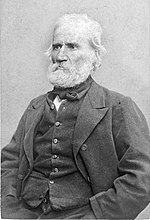Theory of politics ascribed to and derived from the French socialist Louis-Auguste Blanqui (1805-1881).
Capitalist and reactionary regimes are to be overthrown by a revolutionary coup d’etat, carried out by an elite of dedicated revolutionaries. They will then use the power of the state to introduce a regime based on equality.
Critics of Leninism often portray it as a species of Blanquism.
Source:
S Bernstein, August Blanqui and the Art of Insurrection (London, 1971)
Central Revolutionary Committee

Louis Auguste Blanqui
The Central Revolutionary Committee (CRC) was a French Blanquist political party founded in 1881 and dissolved in 1898.
The CRC was founded by Édouard Vaillant to continue the political struggle of Auguste Blanqui (1805–1881). The CRC was a Blanquist party, supporting revolutionary activism, atheism, patriotism, and the Jacobinism of the French Revolution. The CRC was weakened by a split in 1888, when numerous members (Henri Rochefort) followed General Georges Boulanger who synthesized Jacobin nationalism with socialism. Many saw Boulangism as a possible way to socialism. Following the Boulangist dissidence, Vaillant adopted a strategy of syndicalism and strike action.
The CRC was further re-enforced by the affiliation of the Revolutionary Communist Alliance (ACR), formed by dissidents of the Revolutionary Socialist Workers’ Party (POSR) in 1896.
The CRC merged into the Socialist Revolutionary Party in 1898.
Use of the term “Blanquism”
The term “Blanquism” has often been used polemically to accuse some revolutionaries of failing to sufficiently meld their praxis with the mass working class. Karl Marx and Friedrich Engels were keen to distinguish their conception of revolution from Blanquism. As Engels put it in a short fragment, The Program of the Blanquist Fugitives from the Paris Commune:
Blanqui is essentially a political revolutionist. He is a socialist only through sentiment, through his sympathy with the sufferings of the people, but he has neither a socialist theory nor any definite practical suggestions for social remedies. In his political activity he was mainly a “man of action”, believing that a small and well organized minority, who would attempt a political stroke of force at the opportune moment, could carry the mass of the people with them by a few successes at the start and thus make a victorious revolution.[3]
Vladimir Lenin
Rosa Luxemburg and Eduard Bernstein[4] have criticised Vladimir Lenin that his conception of revolution was elitist and essentially Blanquist. For instance, as part of a longer section on Blanquism in her “Organizational Questions of Russian Social Democracy” (later published as “Leninism or Marxism?”), Luxemburg writes:
For Lenin, the difference between the Social Democracy and Blanquism is reduced to the observation that in place of a handful of conspirators we have a class-conscious proletariat. He forgets that this difference implies a complete revision of our ideas on organization and, therefore, an entirely different conception of centralism and the relations existing between the party and the struggle itself. Blanquism did not count on the direct action of the working class. It, therefore, did not need to organize the people for the revolution. The people were expected to play their part only at the moment of revolution. Preparation for the revolution concerned only the little group of revolutionists armed for the coup. Indeed, to assure the success of the revolutionary conspiracy, it was considered wiser to keep the mass at some distance from the conspirators.[5]
It is worth noting that by “social democracy” Luxemburg has in mind the original use of the term derived from Marx and synonymous with “socialism;” she conceived of the social democratic party as a mass based organisation of working class struggle. However, Lenin dismissed as meaningless rhetoric the conflation of Blanquism with Bolshevism:
The bourgeoisie wants, by using the bogy of “Blanquism”, to belittle, discredit and slander the people’s struggle for power. The bourgeoisie stands to gain if the proletarians and peasants fight only for concessions from the old regime. The Right Social-Democrats use the word “Blanquism” merely as a rhetorical device in their polemics. The bourgeoisie converts this word into a weapon against the proletariat: “Workers, be reasonable! Fight for the extension of the powers of the Cadet Duma! Pull the chestnuts out of the fire for the bourgeoisie,[6] but don’t dare to think of such madness, anarchism, Blanquism, as fighting for complete power for the people!”[7]
Lenin himself denied any accusations of Blanquism in The State and Revolution (1917) and accused Bernstein of “opportunism”.[4]
Bibliography
- Bernstein, Samuel. Auguste Blanqui. 1970.
- Hutton, Patrick. The Cult of the Revolutionary Tradition: The Blanquists in French Politics, 1864-1893. 1981.
- Spitzer, Alan. The Revolutionary Theories of Louis-Auguste Blanqui. 1951.

Hello There. I discovered your blog the use of msn. This is an extremely well written article. I will make sure to bookmark it and come back to read more of your helpful info. Thanks for the post. I will definitely return.
Attractive section of content. I just stumbled upon your weblog and in accession capital to assert that I get actually enjoyed account your weblog posts. Any way I’ll be subscribing in your augment and even I achievement you get entry to constantly fast.